The ACTivate Arts Therapy campaign began when numbers of experienced and well qualified Arts Therapists were told they could not apply for the new ‘Mental Health Practitioner in Schools’ positions because their profession is not listed in the 2014 Victorian Mental Health Act. Those listed in the act include Psychologists, Social Workers, Occupational Therapists and Registered Nurses.
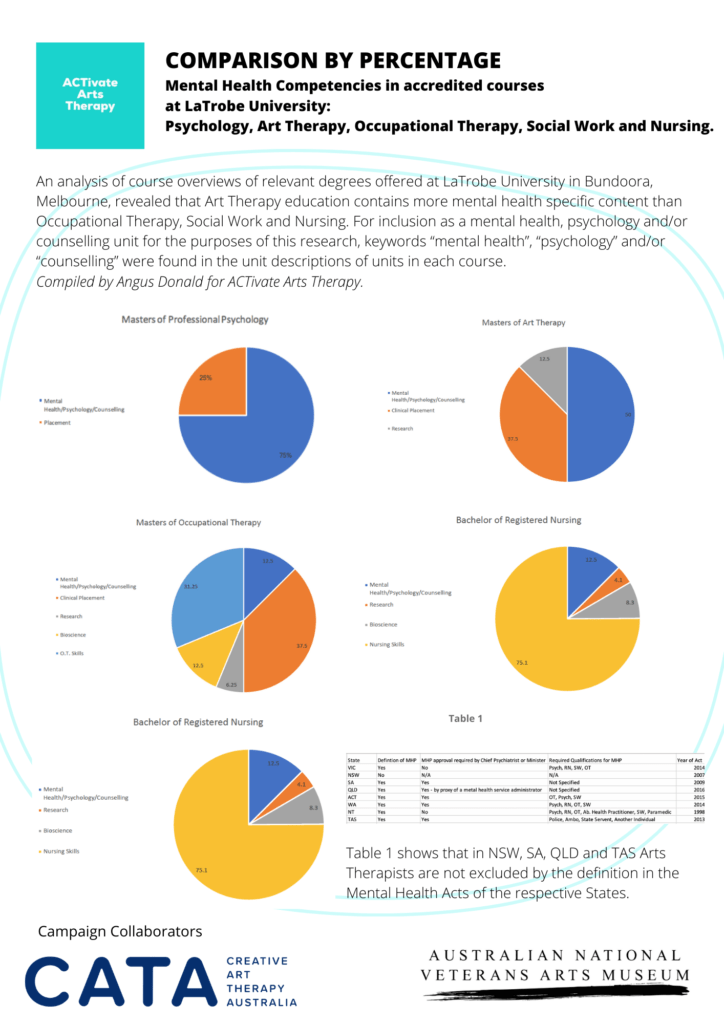
The legislation is outdated and is preventing us from helping the community in this time of greatest need. Arts Therapists are highly trained Mental Health Practitioners with Master’s level Government approved qualifications, and many Arts Therapists already work in mental health and education settings. We are imploring the State Government to change the legislation to reflect the reality and mobilise a work force who are trained and ready to go.
We are now a collective of over 300 Arts Therapists and allies who are service users of Arts Therapy, their friends, family and carers, and our colleagues in Health, Allied Health and Education. With over 4500 supporters who have written testimonials, and campaign collaborators Australian National Veterans Art Museum (ANVAM) and Creative Art Therapy Australia (CATA), we are lobbying the Victorian Government to make legislative changes that will see Master’s qualified Arts Therapists mobilised to help with the current Victorian mental health crisis.
“As an art therapy patient, I have experienced how art therapy is a pathway to discovering my voice… The new understandings of my mental health illness has been the most powerful type of therapy I have encountered… I am moving in the right direction to come to understand how trauma impacts my life. Art therapy is a gentle approach, with outstanding results for me.”
Lived experience testimonial
We wrote to the Victorian Minister for Mental Health on 22 July 2020 seeking advice about expanding the definition of Mental Health Practitioner in the 2014 Victorian Mental Health Act to include Professional Arts Therapists. We drew his attention to Arts Therapists as an untapped workforce of Mental Health Practitioners who are trained, ready and willing to support the community during this COVID-19 crisis and beyond.
Since we first wrote to The Hon Martin Foley (former Minister for Mental Health), over four and a half thousand people who are Arts Therapists, service users of Arts Therapy, their family, friends and carers, Allied Health and Education professionals, have joined the collective and written testimonials.
Those who have signed on to the campaign include many people with lived experience providing moving testimonials about why they have signed the petition and their first-hand experience of the benefits of Arts Therapy. This includes Debbie (Victorian School Teacher and lived experience advocate for Arts Therapy), who has shared her story publicly in the hope that young people today can access this form of help much earlier.
We secured influential formal statements of support from Professor Patrick McGorry AO, (Professor of Youth Mental Health at the University of Melbourne and Director of Orygen Youth Health Research Centre), Dayne Beams (AFL Footballer and lived experience advocate for Arts Therapy), and Mark Watt AM (CEO-Big Brothers Big Sisters).
Professor McGorry’s statement notes that:
“For many people struggling with their mental health, Arts Therapy provides opportunities for help-seeking and engagement that offer something different to traditional talking therapies. It is a mental health promotion activity as well as a therapeutic exercise.”
Prof Patrick McGorry
As Professor McGorry states: “Arts Therapists can play a role in the new Mental Health Practitioner in Schools program. It is a lateral solution to a very real need. They are essential allies in the Mental Health workforce and have the skills and training to address this major threat to mental health in our community.”
We are also supported by Jill Gallagher AO, (CEO of the Victorian Aboriginal Community Controlled Health Organisation, VACCHO, and former Treaty Advancement Commissioner), and Antoinette Braybook, (CEO of Djirra), encouraging access to art therapy by Aboriginal and Torres Strait Islander communities.
Ms Braybrook reports: “In 2019 Djirra engaged an arts therapist to work with our women who were caught up in the justice system, in recognition of the complex sources and impacts of trauma on Aboriginal victim/survivors of family violence. This strategy was successful, offering something very meaningful to women who find it difficult to trust mainstream approaches after years of racist and discriminatory experiences in the broader service system.”
Ms Gallagher has given confirmation of her support for the campaign and our submission to the Commission, in recognition that arts therapy can be more culturally appropriate and accessible for many Aboriginal and Torres Strait Islander people.
“As Aboriginal people we have long understood the benefits of storytelling and meaning making through our art forms. We have a deep cultural connection with our art and that this offers unique opportunities for our healing and recovery. Therefore, to have access to both Active Arts Therapist, the talking therapies and the other allied health professions would be of great benefit to the Victorian Aboriginal Community. “
Jill Gallagher AO
Ann Soo Lawrence has run Arts Therapy groups through Foundation House Sunshine, for the past two years. In her statement, she says “For many in this client population, the concept of mental health was unfamiliar and largely dependent on their cultural frame of reference. Therefore, talking about mental health and engaging clients with its importance required a different kind of ‘language’”
“Where participants could not find the words, mark making, collage and creating a vision boards, engaged them in making and building their story through the felt sense and in construction of their trauma and torture histories. These creations became a springboard to each participant telling their story firstly, with their hands and then, with their voices”
Ann Soo Lawrence
Ms Lawrence highlights how it was through these powerful processes that mental health was supported, explored, storied and de-mystified. Ms Lawrence’ statement provides evidence of the use of arts therapies in migrant and refugee communities, with regard to cultural relevance of the arts in healing and the potential benefits for community members for whom communicating verbally in English may not always be adequate or appropriate. Prof. McGorry likewise notes the important work being done by Arts Therapists “in refugee mental health and it is time to expand access to this support”.
We have collected video testimonies from practicing Professional Arts Therapists as evidence that Arts Therapists already work as Mental Health Practitioners in many settings that are formally recognised.
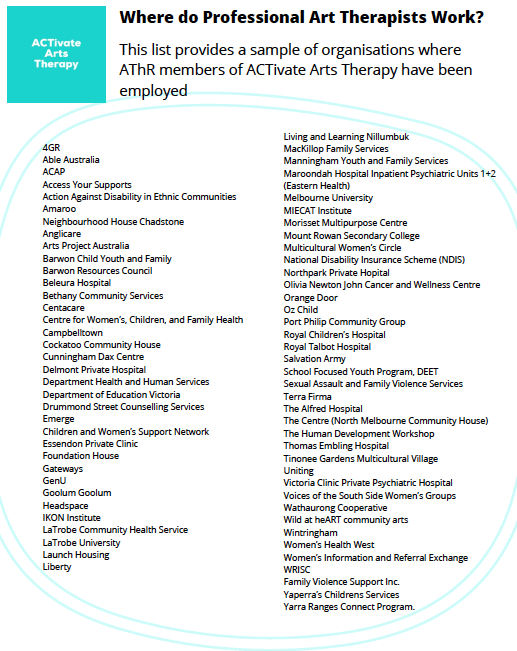
We met with a senior adviser to the Minister for Mental Health, who advised that changes to Victoria’s mental health system will be informed by the findings of the Royal Commission into Victoria’s mental health system. We made a submission to the Commission, and met personally with a Commissioner. We provided the Commission with substantial evidence including the letters of support and thousands of testimonials we had collected. Campaign collaborators, Creative Art Therapies Australia (CATA), provided data and a case example demonstrating very clearly that:
Public uptake of Arts Therapy dramatically increases when the public are aware of availability.
Arts Therapy is made readily accessible through funding, promotion, and mobilised Arts Therapists who are ready to be deployed.
Arts Therapists have been actively engaged in many creative awareness raising activities, sharing stories, images and video online in support of the goals of the ACTivate Arts Therapy campaign, like this beauty “Sometimes” by Pearl Taylor AThR.
We held a community meeting, attended by members of the campaign, and Dr Alisoun Neville and Alana Stewart AThR supported participants to contact their local member with the aim of gathering support. Alana has created a document with DIY steps showing you exactly how to do this, and you can find it in our FB group files:
Numbers of members have already successfully contacted and met with their local members – this is a great result!
Pearl Taylor AThR shared:
“I’ve been able to meet with my local member in a “community coffee catch up” that she does (worthwhile checking if your member does this!). A great way to raise issues in a warm hearted way. Leap frogging off this, I was able to email her our complete package.”
Pearl Taylor AThR
Following this meeting, Pearl’s member did indeed write a beautiful letter of support and sent it to The Hon Minister Merlino, who is now the Victorian Minister for Mental Health, as well as Deputy Premier and Minister for Education.
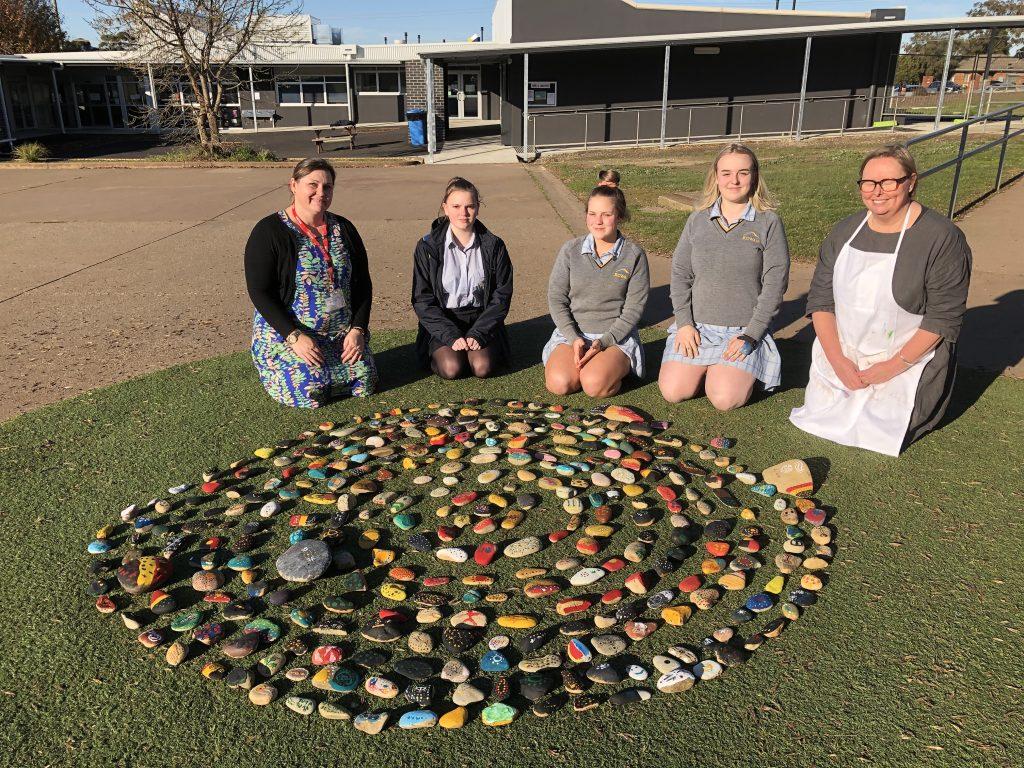
Karryne Hearn AThR has reported similar success:
“Very grateful to share my thoughts on being a Mental Health Practitioner – Creative Arts Therapist with Juliana Addison MP advisor, and what that might look like in schools supporting the needs of students and the ways they understand their lived experiences.”
Karryne Hearn AthR
Louise Weston AThR also organised to meet with her local member, The Hon Ryan Smith MP about the value of Arts Therapy and to enlist his support for the goals of our campaign… not only that, but she HOSTED the meeting in her studio and gave the MP an opportunity to experience Arts Therapy for himself! BRILLIANT!
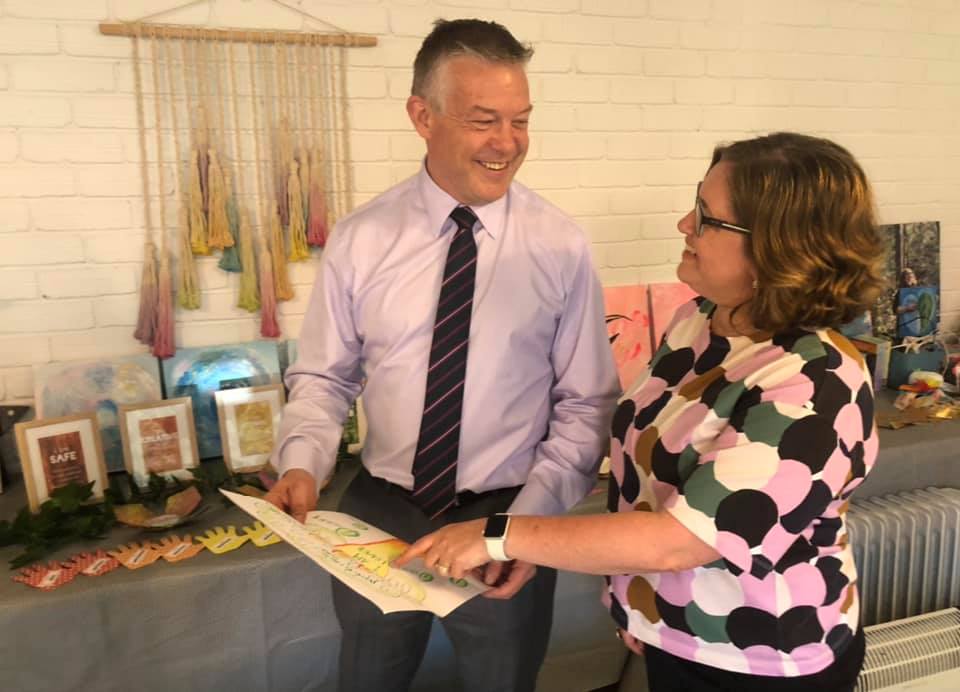
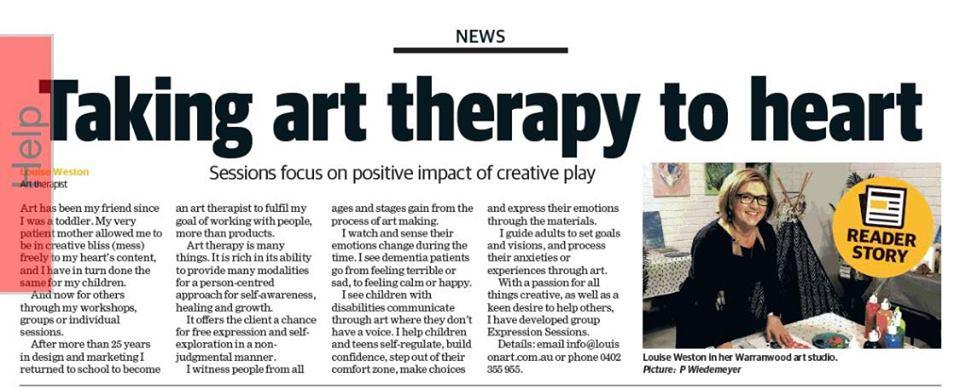
I was personally thrilled to be interviewed about the ACTivate Arts Therapy campaign and featured in ABC’s The Mix segment on Art Therapy for Mental Health month.
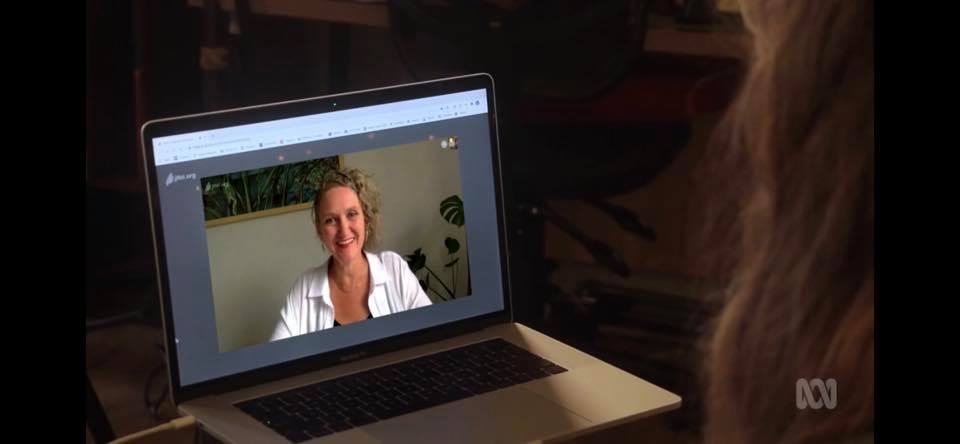
You will find it at 7.07 minutes here:
Many more members of the campaign are continuing this work in many ways, and these are just a few examples. We are a very active collective, our work continues, and will keep up the momentum into 2021.
ACTivate Arts Therapy lead campaigners are currently seeking meetings with Premier Daniel Andrews and the Minister for Mental Health, The Hon James Merlino.
Here are our recommendations:
We urge the Victorian Government to prioritise the inclusion of Arts Therapists as essential allies in Victoria’s mental health system in the following ways:
● Include ‘Professional Arts Therapists’ in the definition of ‘Mental Health Practitioner’ in the Victorian Mental Health Act 2014.
● Expand public access to Arts Therapy by ensuring new positions are open to Arts Therapists in publicly funded mental health services and initiatives, including specifically the Mental Health Practitioners in Schools Program.
● Enable access by Arts Therapists and Art Therapy organisations to Victorian Government funded mental health resources.
Thank you to everyone who has helped and contributed in a multitude of ways. Your integrity, passion and commitment are a force of nature!

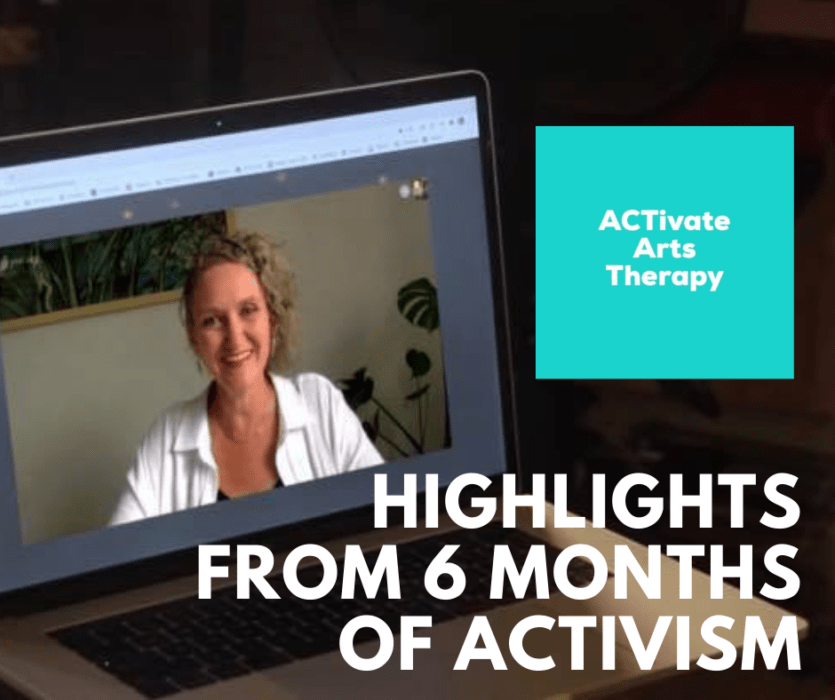
Leave a Reply